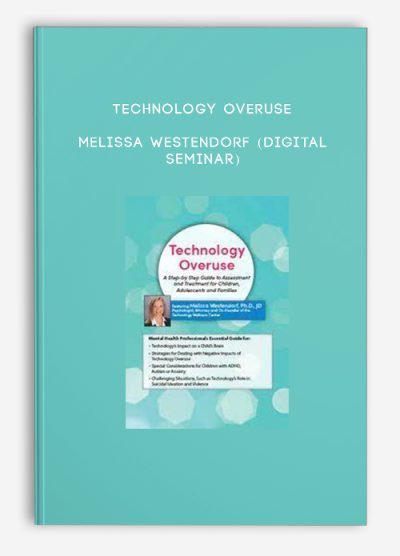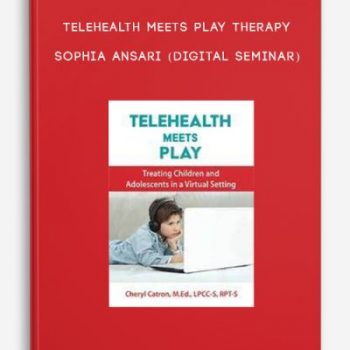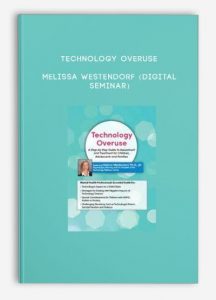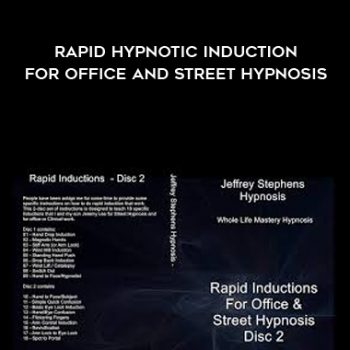Technology Overuse – MELISSA WESTENDORF (Digital Seminar)
Description:
We are in uncharted waters when it comes to children’s technology usage and what it means for the psychological issues that will arise from it. With each passing year, mental health professionals are being forced to find answers for the negative aspects associated with this ever-increasing integration of technology and kids’ lives.
It is imperative that we share the best information we have available to us to help this vulnerable population. We can’t stop the advancement of technology, but we must collectively find ways to minimize the negative impacts that can come with it.
Join Dr. Melissa Westendorf in this recording as she navigates through:
- The impact that technology has on a child’s developing brain
- How to assess technology overuse and how much of an issue it is for your client
- The 4 main areas that are impacted by technology in children
- Special considerations for children who have ADHD, Autism, or Anxiety
- Effective clinical strategies for working with children who are having issues with technology, as well as their parents.
Dr. Westendorf is a psychologist, attorney, and co-founder of the Technology Wellness Center. In her practice, she has assessed multiple young adults faced with legal consequences for behavior that was driven, in part, by technology overuse, which began in adolescence. The legal cases prompted her to co-found the Technology Wellness Center to provide tools and counseling to parents and children struggling with technology overuse issues.
Outline:
How to Know if a Child’s Technology Use is a Problem
- Technology and a Child’s Brain
- Cognitive Processes Impacted by Heavy Technology Use
- Impulse Control, Attention, Focus, Organization
- Assessing Technology Overuse
- The Argument of Overuse versus Addiction
- What is the “Technology Use Continuum” (TUC) and How to Use It
The Four Areas Impacted – And Strategies to Deal with Them
- Behavioral
- Loss of Interest in hobbies
- School Performance
- Withdrawal from Family Interactions
- Lack of Focus
- Physical
- Lack of Exercise
- Lack of Time Spent Outside/Vitamin D
- Sleep Problems
- Emotional
- Loneliness
- Depression
- Self-Esteem/Self-Worth
- Lack of Emotional Development
- Interpersonal
- Impact on Interactions with Peers
- Understanding Social Cues
- Bullying
- Digital Safety
Special Considerations
- Autism
- ADHD/Anxiety
- Pornography
- Social Media
Challenging Situations
- Suicidal Ideation
- Violent Behavior
- Online Predators
Clinical Solutions and Strategies
- Questions to Ask in Session
- What is the Root Cause for the Initial Appointment?
- Is Technology THE Problem or Only Part of the Problem
- What are the Parent’s Goals for Working with a Clinician?
- Ongoing Therapy or Treatment Plans
- Providing Parenting Guidance and Solutions
Legal Issues to Consider
NLP online course
So what is NLP?
Firstly, NLP stands for Neuro-Linguistic Programming. Secondly neuro refers to your neurology;
Thirdly linguistic refers to language however, programming refers to how that neural language functions.
As a result,In other words, learning NLP is like learning the language of your own mind!
Moreover, NLP is the study of excellent communication–both with yourself, and with others.
It was developed by modeling excellent communicators and therapists who got results with their clients.
NLP is a set of tools and techniques, but it is so much more than that.
In conclusion, It is an attitude and a methodology of knowing how to achieve your goals and get results.
Preview Information:
Original Page
Archive Page
More Course: NLP – HYPNOSIS – PHILOSOPHY
Outstanding Course:The New Exposure Therapy – LISA COYNE














Lord –
This is Digital Download service, the course is available at Vincourse.com and Email download delivery.